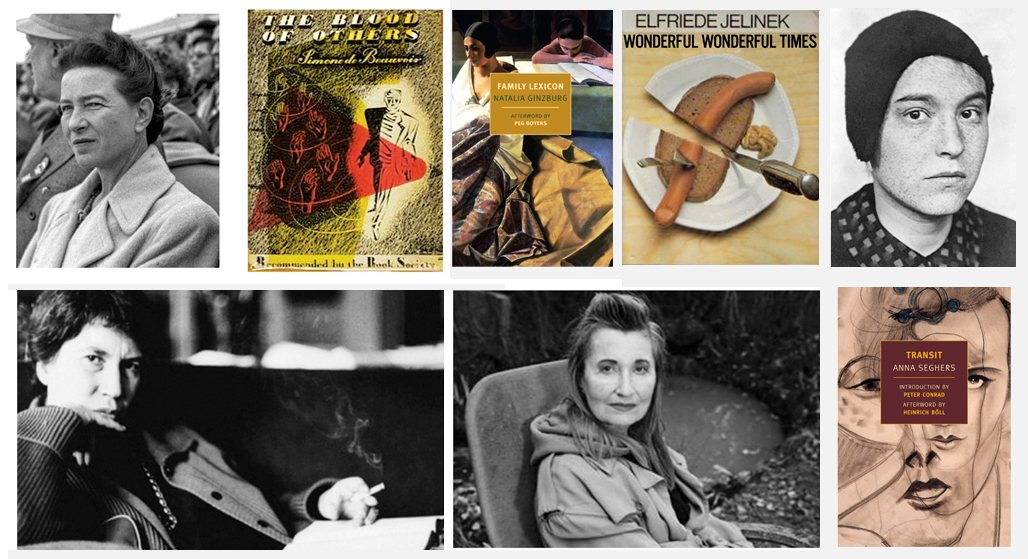
- This event has passed.
Women Write Against Fascism
Thu, December 10, 2020 @ 7:00 PM - 9:00 PM
$35 – $55
Literary resistance during and after fascism being in command
Five more weeks with
Simone de Beauvoir, Natalia Ginzburg, Elfriede Jelinek and Anna Seghers
Reading and discussion with the Literature Studies Group of The MEP
The Blood Of Others • Simone de Beauvoir • 1945
The major theme of The Blood of Others is the relation between the free individual and ‘the historically unfolding world of brute facts and other men and women.’ Or as one of Beauvoir’s biographers puts it, her ‘intention was to express the paradox of freedom experienced by an individual and the ways in which others, perceived by the individual as objects, were affected by his actions and decisions. Another theme of the novel, though not unrelated to the first, is the issue of resistance versus collaboration. Beauvoir makes it clear that to not actively resist fascism is to accept it.
Family Lexicon • Natalia Ginzburg • 1963
Family Lexicon is about a family and language—and about storytelling not only as a form of survival but also as an instrument of deception and domination. The book takes the shape of a novel, yet everything is true. “Every time that I have found myself inventing something in accordance with my old habits as a novelist, I have felt impelled at once to destroy [it],” Ginzburg tells us at the start. “The places, events, and people are all real.” The family described is all anti-fascist. The years depicted in this novel are the years of the 30s and 40s, taking place in Turino during the years of Mussolini’s fascism.
Wonderful Wonderful Times • Elfriede Jelinek • 1980
The novel follows a group of four Viennese teens during the 1950s as they violently engage with the previous generation’s Post-World War II legacy. The novel does not use traditional chapter demarcations and focuses largely on the internal thoughts of the characters. Through the portrayal of the Austrian family Witkowski, the reader is able to see the relation between daily fascism with the family and an undigested Austrian National Socialist history. The patriarch, a former Nazi, makes up for his loss of power and one leg by terrorizing his family and abusing his wife.
Transit • Anna Seghers • 1944
Transit is an existential, political, literary thriller that explores the agonies of boredom,the vitality of storytelling, and the plight of the exile with extraordinary compassion and insight. The 27-year-old unnamed narrator has escaped from a Nazi concentration camp. Along the way to Marseilles, he meets one of his friends, Paul. Paul then asks the narrator to deliver a letter to a writer named Weidel in Paris. When the narrator goes to deliver the letter, he finds out that Weidel has committed suicide. The narrator also finds that Weidel left behind a suitcase full of letters and an unfinished manuscript for a novel.
The MEP LITERATURE GROUP has been meeting to discuss literature since the first days of The Marxist Education Project following a presentation by Roxanne Dunbar-Ortiz on her Indigenous Peoples History of the United States and her recommendation that we take up literature with Leslie Marmon Silko’s Almanac of The Dead. The group has rcompleted readings of Victor Serge’s Unforgiving Years which was followed by Thomas Pynchon’s Gravity’s Rainbow. Our fourth summer of noir is currently underway. Other studies have included novels related to World War I, the depression of the 1930s, and novels on border politics and labor organizing.
Donations are sliding scale • No one turned away for inability to pay
please write to info@marxedproject to get zoom log-in number if you would like to attend but cannot afford to pay
